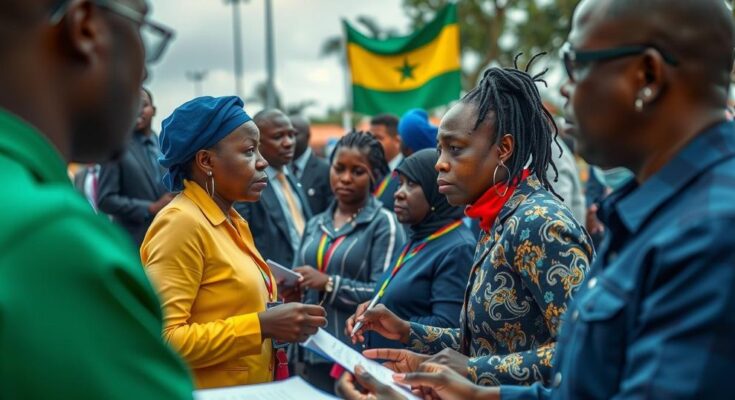Gabon is voting on a new constitution to establish democratic governance following a military coup that ousted President Ali Bongo Ondimba. Approximately 860,000 voters will decide on reforms, including presidential term limits and restrictions on familial succession. General Nguema, the transitional leader, urges support, framing it as a step towards reform. The draft faces criticism, with opponents viewing it as a means for potential dictatorship.
Gabon is currently conducting a significant referendum concerning the adoption of a new constitution, following the military coup which displaced President Ali Bongo Ondimba last year. Approximately 860,000 registered voters are anticipated to participate in this decision, which aims to pave the way for a democratic governance structure after decades of Bongo family rule, which lasted 55 years. The proposed constitutional amendments include instituting presidential term limits and prohibiting familial succession to the presidency, thereby addressing concerns regarding dynastic governance.
The transitional leader, General Brice Oligui Nguema, has actively encouraged voter support for the new draft charter, which is being framed as a step towards reforming Gabon’s political landscape. Nguema, who spearheaded the coup, has assured citizens that civilian rule will be reinstated within two years, although he has also expressed intentions of competing in the upcoming presidential election scheduled for August 2025. The referendum is perceived as a critical initiative in Gabon’s journey towards democratization following Bongo’s removal.
The proposed constitution suggests pivotal changes, notably the establishment of a two-term limit for Presidents, the elimination of the Prime Minister’s position, and the recognition of French as the nation’s official working language. Furthermore, it explicitly states that family members may not succeed a sitting president. Currently, the existing charter permits indefinite renewal of five-year presidential terms.
During the voting process, some citizens, like civil servant Nathalie Badzoko, expressed their support for the military government, despite having limited knowledge of the complete constitution text. Conversely, critics of the draft argue that it is designed to facilitate a strongman’s continued dominance, with lawyer Marlene Fabienne Essola Efountame asserting, “We are creating a dictator who designs the constitution for himself.”
Voting commenced with delays across various polling stations, including the Lycee Leon M’Ba school in Libreville. The polls are set to remain open until 6 PM, with results to be disclosed by the constitutional court, as Gabon navigates its complex political history amidst economic challenges, including significant youth unemployment.
The context of Gabon’s current political atmosphere stems from the military coup that took place in August 2023, which resulted in the ousting of President Ali Bongo Ondimba. This coup marked the end of a long-standing dynastic rule that began with his father, Omar Bongo, in 1967. The country has seen calls for reform and democratization amid widespread discontent over governance and economic disparities, particularly as Gabon’s oil wealth has largely benefited a select few individuals. The proposed constitutional reforms being voted on are seen as a vital first step towards establishing a sustainable and inclusive political system that potentially prevents the recurrence of dynastic rule.
In summary, Gabon’s referendum on the new constitution is a pivotal moment in its political landscape, following the military coup that removed long-time leader Ali Bongo. With significant proposed changes, including presidential term limits, this constitutional vote represents not only an attempt to eradicate dynastic governance but also an essential move toward democratic reform. The outcome of this referendum will greatly influence the future of Gabon, as it seeks to balance the aspirations for democracy with the realities presented by its transitional leadership.
Original Source: www.aljazeera.com




